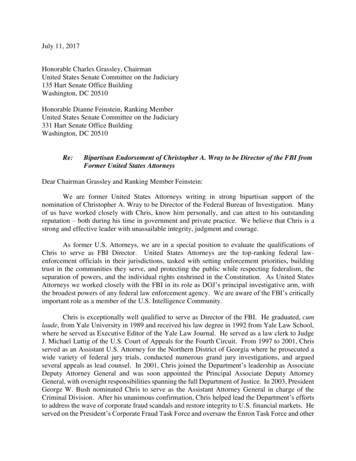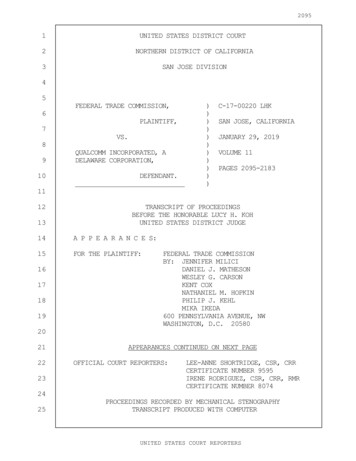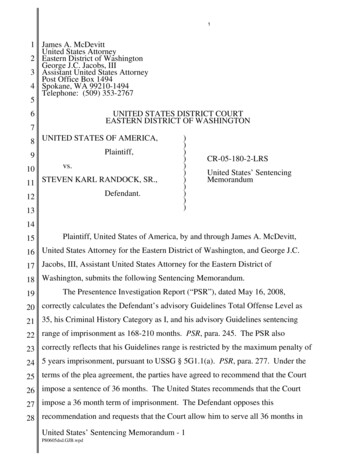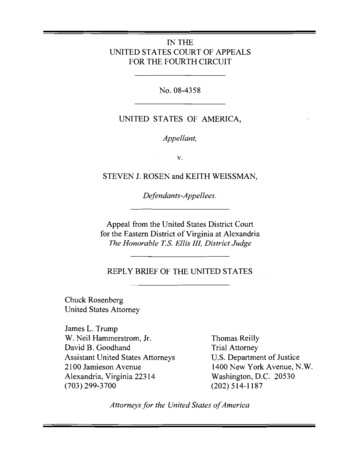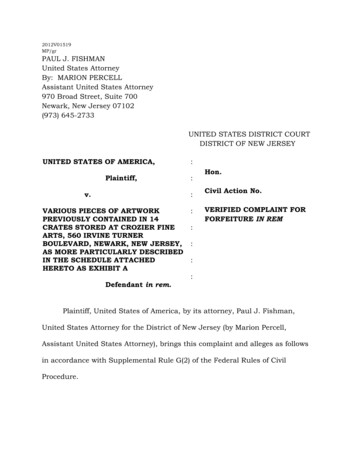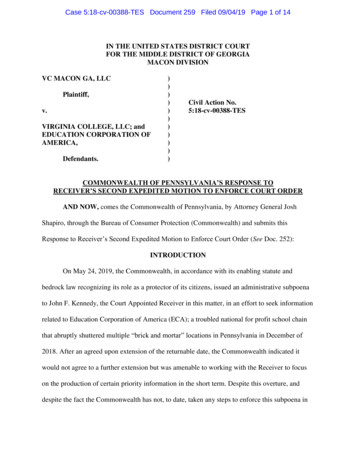
Transcription
Case 5:18-cv-00388-TES Document 259 Filed 09/04/19 Page 1 of 14IN THE UNITED STATES DISTRICT COURTFOR THE MIDDLE DISTRICT OF GEORGIAMACON DIVISIONVC MACON GA, LLCPlaintiff,v.VIRGINIA COLLEGE, LLC; andEDUCATION CORPORATION OFAMERICA,Defendants.)))))))))))Civil Action No.5:18-cv-00388-TESCOMMONWEALTH OF PENNSYLVANIA’S RESPONSE TORECEIVER’S SECOND EXPEDITED MOTION TO ENFORCE COURT ORDERAND NOW, comes the Commonwealth of Pennsylvania, by Attorney General JoshShapiro, through the Bureau of Consumer Protection (Commonwealth) and submits thisResponse to Receiver’s Second Expedited Motion to Enforce Court Order (See Doc. 252):INTRODUCTIONOn May 24, 2019, the Commonwealth, in accordance with its enabling statute andbedrock law recognizing its role as a protector of its citizens, issued an administrative subpoenato John F. Kennedy, the Court Appointed Receiver in this matter, in an effort to seek informationrelated to Education Corporation of America (ECA); a troubled national for profit school chainthat abruptly shuttered multiple “brick and mortar” locations in Pennsylvania in December of2018. After an agreed upon extension of the returnable date, the Commonwealth indicated itwould not agree to a further extension but was amenable to working with the Receiver to focuson the production of certain priority information in the short term. Despite this overture, anddespite the fact the Commonwealth has not, to date, taken any steps to enforce this subpoena in
Case 5:18-cv-00388-TES Document 259 Filed 09/04/19 Page 2 of 14any court, the Receiver has initiated this effort seeking an Order that would direct theCommonwealth to withdraw its lawful subpoena.The Receiver’s action here is an extreme overreach. First, because the Commonwealthhas refrained from seeking to enforce the subpoena, the matter is not ripe for adjudication.Second, the mere issuance of an administrative subpoena seeking information consistent with theCommonwealth’s enabling statue is a clear exercise of the Commonwealth’s police andregulatory power and, therefore, not subject to the stay provisions of the Order AppointingReceiver and Preliminary Injunction (Receivership Order). (See Doc. 26, p. 5 at ¶ 5) As a result,the requested relief should be denied.BACKGROUND1.ADMITTED in part and DENIED in part. It is ADMITTED that this HonorableCourt appointed the Receiver on November 14, 2018 pursuant to the Receivership Order. (SeeDoc. 26). To the extent the averment seeks to characterize the contents of the ReceivershipOrder, the averment is DENIED as stated, as the Order is a writing and speaks for itself.2.DENIED as stated. The Receivership Order is a writing and speaks for itself.3.DENIED as stated. The Receivership Order is a writing and speaks for itself.4.ADMITTED in part and DENIED in part. It is admitted that Jesse F. Harvey filedan appearance in this case and has appeared telephonically before this Court. To the extent thatthe Receiver’s averment attempts to argue that the entry of the appearance is anacknowledgement of this Court’s exclusive jurisdiction over this matter, the averment is aconclusion of law to which no response is required and it is therefore DENIED. See, e.g., In ReMystic Tank Lines Corp., 544 F.3d 524, 528 (3d Cir. 2008) (rejecting a debtor’s argument that2
Case 5:18-cv-00388-TES Document 259 Filed 09/04/19 Page 3 of 14the Bankruptcy Court had exclusive jurisdiction over all aspects of a claim filed by the NewYork Attorney General’s office related to environmental clean-up damages).5.DENIED as stated. The referenced reports are writings authored by the Receiverand speak for themselves.6.DENIED as stated. The referenced Motion for Entry of an Order (1) ApprovingProposed Claims Administration Procedures and (2) Granting Related Relief (See Doc. 158) andOrder Approving Receiver’s Motion for Entry of an Order (1) Approving Proposed ClaimsAdministration Procedures and (2) Granting Related Relief (Claims Order) (See Doc. 175) arewritings and speak for themselves.7.ADMITTED in part and DENIED in part. It is ADMITTED that theCommonwealth did not object to the Claims Order. It is DENIED as stated that theCommonwealth “materially participated” in the drafting of the Claims Order through “extensive”negotiations. By way of further response, the parties did engage in discussions related to theclaims process.8.ADMITTED. By way of further reply, the Commonwealth incorporates itsresponse in Paragraph 4, above.9.The Receiver’s averment is a conclusion of law to which no response is requiredand it is therefore DENIED.10.ADMITTED in part and DENIED in part. It is ADMITTED that theCommonwealth issued an administrative subpoena on May 24, 2019. To the extent the avermentseeks to describe the contents of the administrative subpoena, the averment is DENIED as stated:the subpoena is a writing and speaks for itself. Additionally, the Receiver’s attempt tocharacterize the subpoena as “overly broad” is a conclusion of law to which no response is3
Case 5:18-cv-00388-TES Document 259 Filed 09/04/19 Page 4 of 14required and it is therefore DENIED. By way of further response, the genesis of theCommonwealth’s issuance of the subpoena stemmed, in part, from Receiver’s intention to sellstudent accounts receivable in the wake of the following:a. the closure, without any warning, of multiple schools in December of 2018,including four Pennsylvania Brightwood Career Institute schools located inHarrisburg (141 students), Broomall (318 students), Philadelphia Mills (518students) and Philadelphia Market Street (359 students). (See Receiver’sInitial Report, Doc. 99, Ex. C (listing schools and the campus population atthe end of November 2018)).b. federal statistics, showing that Pennsylvania Brightwood locations hadrelatively high cohort default rates compared to the 2015 national average of10.8% and that certain programs located in the Pittsburgh Brightwoodlocation failed the Gainful Employment metric.1c. representations to students regarding the quality of instruction and studentservices, including continuous career development. See Brightwood CareerInstitute-Harrisburg Catalog, attached hereto as Exhibit “A.”d. the chronicled financial troubles that ECA faced. See ECA’s EmergencyMotion for the Appointment of a Receiver and Entry of a TemporaryRestraining Oder and Preliminary Injunction (Emergency Motion). (See Doc.1See grams-That/238851 (showing that the Pittsburgh basedBrightwood Career Institute had three programs that failed the Gainful Employment metric as graduates had annualloan payments that exceeded 12 percent of their total earnings or 30 percent of their discretionary income) ment/cdr.html (showing the 2015 cohort default rates for thePennsylvania Brightwood locations ranging from 25.9% to 34.4%).4
Case 5:18-cv-00388-TES Document 259 Filed 09/04/19 Page 5 of 1410, p. 10) (noting its failure to meet Department of Education financialresponsibility standards).e. ECA’s accreditation difficulties. See August 31, 2018 letter from theAccrediting Council for Continuing Education and Training (ACCET) toVirginia College, LLC, denying accreditation, attached hereto as Exhibit “B”;December 4, 2018 letter from the Accrediting Council for IndependentColleges and Schools (ACICS) to ECA withdrawing accreditation, attachedhereto as Exhibit “C”; and Emergency Motion (See Doc. 10, p. 3) (notingACICS was not recognized as an accreditor by the previous Administration).11.DENIED as stated. The Receiver has not produced a “substantial amount” ofmaterials to the Commonwealth. To date, the Receiver has only produced two student accountsreceivable spreadsheets. By way of further response, the parties initially worked in good faithregarding a subpoena production schedule and the student accounts receivable issue but wereultimately unable to reach an agreement on either matter.12.DENIED as stated. The Expedited Motion for Order (1) to Sell the CertainAccounts Receivable Other than in the Ordinary Course of Business Free and Clear of Liens,Claims, Encumbrances and Other Interests, and (2) for Related Relief (Sale Motion) (See Doc.223) is a writing and speaks for itself.ARGUMENTA. The Receiver’s Motion is Not Ripe Because the Commonwealth has Not InitiatedEnforcement ProceedingsThe administrative subpoena was issued pursuant to Section 307-3(a) of theAdministrative Code of 1929, 71 P.S. § 307-3(a), which provides as follows:5
Case 5:18-cv-00388-TES Document 259 Filed 09/04/19 Page 6 of 14.In case of disobedience of any subpoena or the contumacy of anywitness appearing before the Attorney General or his representative,the Attorney General or his representative may invoke the aid of theCommonwealth Court or of any court of record of theCommonwealth, and such court may thereupon issue an orderrequiring the person subpoenaed to obey the subpoena or to giveevidence or to produce books, accounts, papers, records, documents,and files relative to the matter in question.§ 307-3(a).As the statute makes clear, the subpoena at issue is not self-executing. Further, as noted,the Commonwealth has not sought to initiate a subpoena enforcement action in any Pennsylvaniaor Federal court. In light of these facts, the Receiver’s request for relief is untimely. See, e.g.,HA&W Wealth Mgmt., LLC v. U.S. Dep't. of Labor, Emp. Benefits Sec. Admin., No.116CV04446RWSRGV, 2017 WL 11113756, at *3 (N.D. Ga. Feb. 8, 2017), report andrecommendation adopted, No. 116CV04446RWSRGV, 2017 WL 11114470 (N.D. Ga. Apr. 6,2017) (dismissing a petition seeking to quash a United States Department of Laboradministrative subpoena that was not self-executing, where the Department had taken no actionto enforce the subpoena, stating, “[t]he fact that the Secretary must resort to federal court forenforcement of an administrative subpoena means that Wealth Management has a forum inwhich to raise its objections to the PKS subpoena without bringing its pre-enforcement petitionto quash the subpoena”); Google, Inc. v. Hood, 822 F.3d 212, 224-26 (5th Cir. 2016) (findingGoogle’s attempt to enjoin enforcement of a non-self-executing administrative subpoena issuedby the Mississippi Attorney General’s office under the Mississippi Consumer Protection Act wasnot ripe where Mississippi had not initiated an enforcement action); In re Ramirez, 905 F.2d 97,98 (5th Cir. 1990) (stating, “where an agency must resort to judicial enforcement of itssubpoenas, courts generally dismiss anticipatory actions filed by parties challenging such6
Case 5:18-cv-00388-TES Document 259 Filed 09/04/19 Page 7 of 14subpoenas as not being ripe for review because of the availability of an adequate remedy at lawif, and when, the agency files an enforcement action”).In the instant matter, the administrative subpoena was served and accepted and, similar toHood, supra, was then subject to discussions between the parties. Nevertheless, theCommonwealth has not, to date, initiated an enforcement action. In the event it chooses toinitiate such an action, the Receiver will be able to seek relief within the context of thatproceeding. Based upon the established case law, the Receiver’s requested relief should bedenied.B. The Issuance of the Administrative Subpoena is an Exercise of theCommonwealth’s Police and Regulatory Power that is Not Subject to theRestrictions Set Forth in the Receivership OrderThe Commonwealth’s effort to gain information is a standard exercise of its police andregulatory powers. At stake in this instance are thousands of student accounts with millions ofdollars at issue in the form of student debt that arose from the business practices of ECA. Inorder to learn more about those business practices, the Commonwealth issued an administrativesubpoena as is often the case in its investigations. These subpoenas are expressly authorized byPennsylvania law under § 307-3(a) that states at pertinent part:The Attorney General shall be authorized to require the attendanceand testimony of witnesses and the production of any books,accounts, papers, records, documents, and files relating to anycommercial and trade practices which the Bureau of ConsumerProtection has authority to investigate and conduct private or publichearings; and, for this purpose, the Attorney General or hisrepresentative may sign subpoenas, administer oaths oraffirmations, examine witnesses and receive evidence during anysuch investigation or public or private hearing § 307-3(a).7
Case 5:18-cv-00388-TES Document 259 Filed 09/04/19 Page 8 of 14Contrary to the Receiver’s contention that the Commonwealth is seeking to interfere withthe orderly administration of the receivership estate and is pursuing a pecuniary purpose2 inissuing the subpoena, the Commonwealth is attempting to exercise its charge to investigatefraud, misrepresentation and deception. See § 307-2 of the Administrative Code of 1929.3Specifically, to the extent that former attendees are currently paying, or may be asked topay, on loans owed to directly to ECA, and to the extent these amounts resulted frominstitutional misconduct, these individuals are subject to continuing harm, regardless of ECA’sclosure. See Com. v. Percudani, 844 A.2d 35, 46 (Pa.Cmwlth. 2004) (observing enforcement ofthe Pennsylvania Unfair Trade Practices and Consumer Protection Law (Consumer ProtectionLaw), 73 P.S. 201-1 et seq., would be frustrated if a party could simply avoid liability bydiscontinuing its actions). By way of example, and without limitation, collection of theseamounts could, therefore, run afoul of the Consumer Protection Law and the Pennsylvania FairCredit Extension Uniformity Act, 73 P.S. § 2270.1 et seq., which declares violations of the FairDebt Collection Practices Act, 15 U.S.C. § 1692 et seq., to be unfair and deceptive debt2The Receiver references In re Enron Corp., 314 B.R 524 (S.D.N.Y. 2004) in attempting to argue that theCommonwealth is acting in its own pecuniary interest as opposed to acting in the public interest. Enron, however,articulated that courts should apply an objective analysis based upon the purpose of the laws the governmental unitis seeking to enforce; not the government’s subjective intent in seeking relief from the stay. See Enron, 314 B.R. at535. While Enron ultimately did not permit relief from the stay, its application of the objective test has beencriticized. See, e.g., U.S. ex rel. Fullington v. Parkway Hosp., Inc., 351 B.R. 290, n. 8 (E.D.N.Y. 2006) (applying theobjective analysis and noting that Enron “curiously invoked” the subjective analysis); In re General Motors LLCIgnition Switch Litigation, 69 F. Supp. 3d 404, 411-12 (S.D.N.Y. 2014) (stating the inquiry is objective andconcluding that efforts under the California Unfair Competition Law fell within the police power exception).3Section 307-2 of the Administrative Code of 1929, 71 P.S. § 307-2, states that the Bureau of Consumer Protectionshall have the power and its duties shall be:(1)To investigate commercial and trade practices in the distribution, financing and furnishing of goods andservices to or for the use of consumers in order to determine if such practices are detrimental to thepublic interest, and to conduct studies, investigations and research in matters affecting consumer interest. and(2)To investigate fraud, misrepresentation and deception in the sale, servicing and financing of consumer goodsand products.8
Case 5:18-cv-00388-TES Document 259 Filed 09/04/19 Page 9 of 14collection acts or practices subject to enforcement under the Consumer Protection Law. See §2270.4(a).Even if the matter was ripe for determination, which it is not, the Receivership Order (SeeDoc. 26) contemplates that the stay provisions therein are not subject to an exercise of police andregulatory matters. Specifically, the Order states at relevant part:The Receiver shall take immediate possession of the ReceivershipProperty and shall have the full power and authority to exercise theusual and customary powers afforded to a receiver under federalcommon law (except as otherwise limited by an order of this Court),including, but not limited to, the following powers: .(5) To intervene in, remove, and/or transfer to this Court any actionin which a claim is asserted against ECA or any actual or purportedguarantor of a real property lease involving ECA or any ECAaffiliate, whether such claim is a direct or a derivative claim or thesubject of any claim to which any party to such other proceedingholds or asserts any right of indemnification, reimbursement orcontribution against ECA, for the purpose of prosecuting ordefending the claim and requesting the transfer of venue of theaction to this Court, except that this Order does not transferactions in which a state agency is a party and as to which suchstate is exercising its police or regulatory powers[ ](emphasis added) (See Doc. 26, pp. 4-5).The exercise of police and regulatory powers has been widely discussed in analogousbankruptcy proceedings.4 Specifically, § 362(b)(4) of the Bankruptcy Code, 11 U.S.C. §362(b)(4), provides that the automatic stay, “does not operate as a stay of the commencement orcontinuation of an action or proceeding by a governmental unit to enforce such governmentalThe Attorney General’s use of Bankruptcy Court cases as precedent in this receivership matter is guided bydecisions of this Circuit. See Bendall v. Lancer Mgmt. Grp., LLC, 523 F. App’x 554, 557 (11th Cir. 2013) (“[g]iventhat a primary purpose of both receivership and bankruptcy proceedings is to promote the efficient and orderlyadministration of estates for the benefit of creditors, we will apply cases from the analogous context of bankruptcylaw, where instructive, due to limited case law in the receivership context”).49
Case 5:18-cv-00388-TES Document 259 Filed 09/04/19 Page 10 of 14unit’s police or regulatory power.” § 362(b)(4). The relevant legislative history describes thegeneral purpose of the exception, stating:Thus, where a government unit is suing a debtor to prevent or stopviolation of fraud, environmental protection, consumer protection,safety, or similar police or regulatory laws, or attempting to fixdamages for violation of such law, the action or proceeding is notstayed under the automatic stay.See S.Rep. No. 95-989, 95th Cong., 2d Sess. 51, 52, reprinted in 1978 U.S.Code Cong. &Ad.News 5787, 5837; H.Rep. No. 95-595, 95th Cong., 2d Sess. 342, 343, reprinted in1978 U.S.Code Cong. & Ad.News 5963, 6299 (emphasis added).In Penn Terra Ltd. v. Dept. of Envtl. Res., Com. of Pa., 733 F.2d 267, 272 (3d Cir. 1984),the Third Circuit described the legislative history and framework of § 362 following an agency’sstate court injunctive action that resulted in an order requiring a bankrupt defendant to remedyenvironmental damage. Ultimately, in deference to state law, Penn Terra determined that aliberal construction of the exceptions to the automatic stay provisions was warranted. Penn TerraLtd., 733 F.2d at 273-74 (noting, “the police power of the several States embodies the mainbulwark of protection by which they carry out their responsibilities to the People; its abrogationis therefore a serious matter”).The exercise of state police and regulatory power in the area of consumer protection iswell recognized. In re Gallagher, No. 08-41445, 2010 WL 2507219, at *1 (Bankr. M.D. Ga. Jun.16, 2010) (holding the police-power exemption applies to the commencement of an actionwhere, “a governmental unit is suing a debtor to prevent or stop a violation of fraud,environmental protection, consumer protection, safety, or similar police or regulatory laws, orattempting to fix damages for violation of such law”); In Re Family Vending, Inc., 171 B.R. 907(Bankr. N.D. Ga. 1994) (finding Georgia Attorney General’s action under Georgia’s FairBusiness Practices Act seeking fines and restitution was not an effort to seek pecuniary damage10
Case 5:18-cv-00388-TES Document 259 Filed 09/04/19 Page 11 of 14it had suffered, but instead an action to stop consumer fraud and therefore an exercise of itspolice and regulatory power not subject to the bankruptcy stay); In re Guardia, 522 B.R. 734,735-36 (Bankr. S.D. Fla. 2014) (holding Florida Attorney General action under its unfair tradepractices act seeking restitution and injunctive relief not stayed); In re Nortel Networks, Inc., 669F.3d 128, 137-38 (3d Cir. 2011) (noting, in considering the police power exception to anautomatic bankruptcy stay under 11 U.S.C. § 362(b)(4), that consumer protection is part ofgovernmental police powers); In Re Burns, No. 5-BK-07-50140 RNO, 2008 WL 3246244, at *4(Bankr. M.D. Pa. Aug. 7, 2008) (finding the Commonwealth’s action under the PennsylvaniaConsumer Protection Law to be part of its mandate to ensure consumer protection, by seekingrestitution not only to assist those who were allegedly harmed by the Debtor’s conduct, but alsoto fulfill the broader goal of protecting the public at large from unsavory practices); Com. ex rel.Corbett v. Hasan, No. 150 C.D. 2012, 2013 WL 3970234, at *6 (Pa.Cmwlth. May 2, 2013)(noting Commonwealth’s ability to enforce consumer protection statutes are part of its police orregulatory powers).Consistent with the above authority, the Bankruptcy Court for the Middle District ofFlorida has expressly held that the Federal Trade Commission (FTC) could pursue its claims forrestitution against a chapter 13 debtor in district court despite debtor’s pending bankruptcy case:The case law is clear that an action to enjoin illegal conduct and toobtain restitution for that conduct falls squarely within the scope ofthe paragraph (b)(4) exception. Federal Trade Commission v. AustinGalleries of Illinois, Inc., 1991 WL 18430, 1991 U.S. Dist. Lexis1223 [exception to automatic stay allowed the entry of judgment butprecluded enforcement]; Federal Trade Commission v. AmericanStandard Credit Systems, Inc., 874 F.Supp. 1080, 1091(C.D.Cal.1994)[action to enjoin conduct and obtain restitutionexcepted from automatic stay]; Ngan Gung Restaurant, Inc. v. NewYork (In re Ngan Gung Restaurant, Inc.), 183 B.R. 689, 695(Bankr.S.D.N.Y.1995) [government actions under both federal andstate labor laws seeking restitution excepted from automatic stay].11
Case 5:18-cv-00388-TES Document 259 Filed 09/04/19 Page 12 of 14In Re Dolen, 265 B.R. 471, 481 (Bankr. M.D. Fl. 2001).It is also important to note, that, unlike the current matter, all of the aforementioned casesinvolved circumstances where the relevant Attorneys General or agencies had initiated some typeof non-bankruptcy court proceeding against the debtor. Again, there is no such parallel pendingaction here. Nevertheless, in a similar case where the Department of Housing and UrbanDevelopment (HUD) sought to enforce a non-self-executing subpoena against a bankrupt HUDprogram participant, the Bankruptcy Court held that the issuance of a subpoena was an exerciseof HUD’s police and regulatory power and was therefore not subject to the bankruptcy stay. SeeU.S. Dept. of Housing and Urban Dev. v. Sutton, 68 B.R. 89, 94 (Bankr. E.D. Mo. 1986) (stating,“[t]he law is clear that the “police or regulatory power” language of the § 362(b)(4) exceptionrelates only to the public health, welfare, morals, and safety, and not to matters of purelypecuniary interest”).Simply put, the Commonwealth is not pursuing its own pecuniary interest here. It onlyseeks information consistent with its historic police and regulatory powers in an effort to protectits citizens.C. The Commonwealth’s Subpoena is Not Detrimental to the ReceivershipProceedingsThe Receiver’s argument that the issuance of a subpoena is “highly disruptive” to theadministration of the Receivership Estate is belied by the fact the Commonwealth has notattempted to enforce the subpoena. Further, the Commonwealth engaged in discussions with theReceiver regarding the scope of the production. Finally, the Receivership Order itselfcontemplates the possible production of information. (See Doc. 26, p. 13).12
Case 5:18-cv-00388-TES Document 259 Filed 09/04/19 Page 13 of 14CONCLUSIONThe Commonwealth has not sought to enforce the administrative subpoena at issue and,therefore, this matter is not ripe for judicial determination. Further, the Commonwealth’sissuance of the subpoena was an exercise of its police and regulatory power and is not subject tothe stay set forth in the Receivership Order. For the forgoing reasons, the Receiver’s SecondExpedited Motion to Enforce Court Order should be denied.Respectfully Submitted,COMMONWEALTH OF PENNSYLVANIAOFFICE OF ATTORNEY GENERALJOSH SHAPIROATTORNEY GENERALDATE: 9/4/19/s/ Jesse F. HarveyJesse F. HarveyChief Deputy Attorney GeneralPA I.D. No. 63435Office of Attorney GeneralBureau of Consumer Protection1251 Waterfront Place-Mezzanine LevelPittsburgh, PA 15222(412) 565-2883jharvey@attorneygeneral.gov13
Case 5:18-cv-00388-TES Document 259 Filed 09/04/19 Page 14 of 14CERTIFICATE OF SERVICEI hereby certify that I electronically filed the foregoing with the Clerk of Court using theCM/ECF system, on this the 4th day of September 2019, which will send email notification to allcounsel of record./s/ Jesse F. HarveyJesse F. HarveyChief Deputy Attorney GeneralP.A. I.D. No. 63435Office of Attorney GeneralBureau of Consumer Protection1251 Waterfront PlaceMezzanine LevelPittsburgh, PA 15222(412) 565-2883jharvey@attorneygeneral.gov14
Case 5:18-cv-00388-TES Document 259-1 Filed 09/04/19 Page 1 of 762017 - 2018 CATALOGBrightwood Career Institute5650 Derry StreetHarrisburg, Pennsylvania 17111Telephone: 717.558.1300Toll-Free: 800.272.4632Fax: 717.558.1342www.brightwoodcareer.eduPublication Date: 5/11/20181
Case 5:18-cv-00388-TES Document 259-1 Filed 09/04/19 Page 2 of 76TABLE OF CONTENTS2017 - 2018 CatalogInstitution InformationMission and ObjectivesHistoryEquipmentFacilitiesLearning Resource CenterAccrediting Agencies, Approvals, and MembershipsAdministration, Staff, and FacultyOwnershipMain/Branch/Auxiliary Classroom LocationsCatalog CertificationAdmission InformationProvisional EnrollmentAdmission Requirements and ConditionsPolicy for re-entry of withdrawn studentsApplicants for Single CoursesPrior Learning AssessmentTransfer of Credit between Education Corporation ofAmerica (ECA) CampusesStudent Information and ServicesAdvisingStudent ResponsibilitiesStudent Conduct PolicyStudent InteractionPersonal AppearanceIntellectual Property Protection and OwnershipStudent Complaint/Grievance ProcedureState AgenciesNondiscrimination/Nonharassment PolicyCareer DevelopmentStudent Health ServicesStudent HousingTutoringTechnology and Equipment Requirements for DigitalInstructionSummary of Delivery SystemStudent Verification PolicyCrime Awareness and Campus SecurityDrug and Alcohol Abuse Awareness and PreventionFamily Educational Rights and Privacy ActPersonal PropertyAcademic InformationClass SizeHours of OperationDefinition of an Academic YearDefinition of a Unit of CreditOut-of-Class Learning ActivitiesRequired Study TimeChanges in Programs or Policies14English as a Second Language InstructionAttendance/Tardiness PolicyMake-Up StandardsPregnancy PolicyStudent Deployment PolicySuspension and DismissalExternship/Practicum, Clinical, or FieldworkDropping or Adding CoursesProgram TransfersCertification, State Board, and National Board ExamsGraduation RequirementsTranscriptsTransfer of Credit to Other SchoolsGraduate Refresher Courses4455556779101010121213Academic StandardsGrading SystemRepeated CoursesSatisfactory Academic ProgressAppeals ProcedureFinancial Information1415Financial Aid ServicesScholarshipsEnrollment StatusTuition and FeesRefund PolicyWithdrawal from the Institution15151617171718202627282828Academic ProgramsCourse Numbering SystemSpecialized Associate's Degree ProgramsComputer Networking TechnologyProgram DescriptionCurriculumMedical AssistingProgram DescriptionCurriculumDiploma ProgramsMedical AssistantProgram DescriptionCurriculumMedical Billing and CodingProgram DescriptionCurriculumShort CoursesLicensing and Continuing Education/ProfessionalDevelopment TrainingACADEMIC CALENDAR2017 Academic CalendarHoliday ScheduleTerm Breaks for Degree ProgramsBreak Days for Diploma 2535858596464646568686972727272727373
Case 5:18-cv-00388-TES Document 259-1 Filed 09/04/19 Page 3 of 762017 Computer Networking Technology2017 Medical Assistant & Medical Billing and Coding2017 Medical Assisting2018 Academic CalendarHoliday Schedule2018 Computer Networking Technology2018 Medical Assistant & Medical Billing and Coding2018 Medical Assisting73737474747575753
Case 5:18-cv-00388-TES Document 259-1 Filed 09/04/19 Page 4 of 76INSTITUTION INFORMATIONMission and ObjectivesBrightwood Career Institute is an institution of higher education dedicated to providing quality programs thatintegrate curriculum with professional skill development, empowering students to achieve their lifelong personaland professional goals.To accomplish its mission, Brightwood Career Institute established the following objectives:1.2.3.4.5.6.Provide programs that are continually assessed by faculty, staff, and members of the business andeducation communities;Provide intensive and comprehensive instruction that strengthens student academic achievement;Instill in its students the value of lifelong learning by stimulating intellectual curiosity, creative andcritical thinking, and awareness of diversity;Plan and provide facilities and resources that respond to the needs of students, faculty, and staff;Assist students in developing professional attitudes, values, skills, and strategies that will enhance theirpotential for success in their careers and in life; andProvide the community with individuals who can meet the ever-changing needs of business, government,and industry now and in the future
10.8% and that certain programs located in the Pittsburgh Brightwood location failed the Gainful Employment metric.1 c. representations to students regarding the quality of instruction and student services, including continuous career development. See Brightwood Career Institute-Harrisburg Catalog, attached hereto as Exhibit "A." d.





